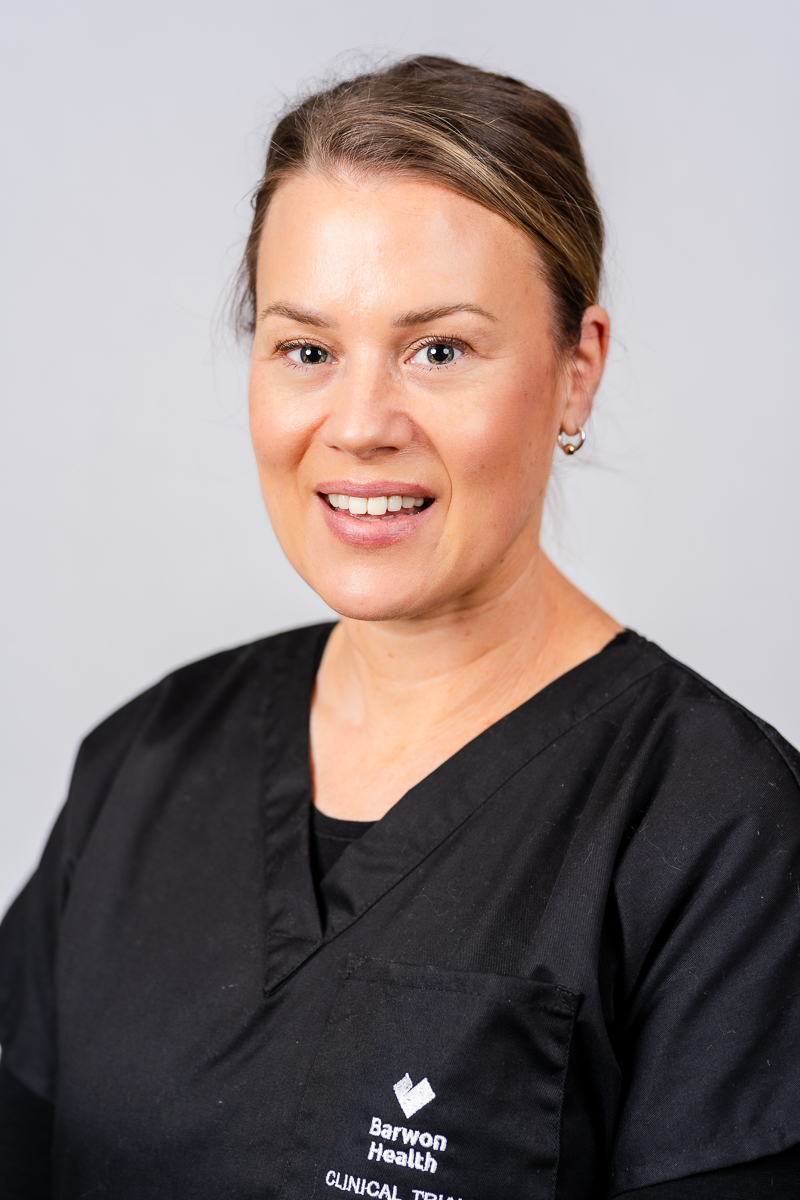Infectious Diseases
The Department of Infectious Diseases Research Team, in partnership with the GCEID, is a multidisciplinary group that tackles the transmission, treatment and prevention of some of the public’s most pressing health challenges, including:
- COVID-19
- Healthcare-associated infections
- Emerging infectious diseases
- Mycobacteria ulcerans (Buruli Ulcer)
- Infections of medical devices
- C. difficile infection
- Hepatitis C
- Infective endocarditis (infection of the heart)
- Antimicrobial resistance
- HIV
- Staphylococcal infections
In addition, we are leaders in development of strategies and safeguards in the areas of refugee health and antimicrobial stewardship (responsible use of antibiotics).
Our Department is also a significant and active member of the Barwon Health Clinical Trials Unit (CTU), which, over 25 years and with the contribution of thousands of volunteers, is regarded as one of the leading hubs for clinical trials in the development of new treatments and technologies. The CTU is renowned for its start-up timelines and is national lead on the majority of its global commercially sponsored clinical trials.
Keen to find out more about clinical trials at Barwon Health?
Click here to watch CTU trials in COVID-19 vaccines and other infections: Ms Kathryn Ellis, Manager, Clinical Trials Unit (CTU), Barwon Health (7 min)
Click here to watch Infectious disease trials in shingles vaccine, long COVID: Prof Eugene Athan, Director, Dept of Infectious Diseases, Barwon Health (3 min)
Research Areas
Transmission of Buruli Ulcer
Supported by a $3 million NHMRC Partnership across Barwon Health, Deakin University, CSIRO and the University of Melbourne, we lead several clinical studies and a large case-control study to help identify the potential environmental and behavioural factors causing disease transmission. We were invited to present their world-leading research at the WHO Buruli ulcer meeting in Geneva in 2023.
Our team have also published an article in the Clinical Infectious Disease Journal that for smaller Buruli ulcers, six weeks may be as effective as the currently recommended eight weeks of combined antibiotic therapy in curing lesions without surgery. In addition, an article published in the journal Antimicrobial Agents and Chemotherapy identified risk factors associated with antibiotic treatment failure of Buruli ulcer.
Real world Efficacy of Antiviral therapy in Chronic Hepatitis C (REACH-C)
Reach-C is a cohort study being run by the Kirby Institute collecting real-world outcomes for direct-acting antiviral treatment for Hepatitis C infections.
Current estimates of the efficacy of new hepatitis C medications are based on data from populations that are not consistent with Australians living with hepatitis C. Understanding the new patterns of treatment prescription, as well as treatment outcomes in real-world settings, is critical to inform planning for future HCV services within Australia.
Barwon Health has contributed over 240 patients to this study, which will identify factors that lead to treatment success or failure in the Australian context. This in turn will better equip healthcare professionals to improve communication with their patients and the public around the treatment for hepatitis C.
COVID-19 Research
We are leading a prospective cohort study of all COVID-19 (coronavirus) cases in the Barwon South West region. The study aims to gain an understanding of the natural history, complications and immunity of COVID-19 cases in our region.
For more information visit the Barwon Health COVID-19 research site.
Clinical Trials, including COVID vaccines
We have been conducting investigator-initiated and commercially sponsored clinical trials for over a decade. Clinical trials have been conducted in collaboration with the Clinical Trial Unit and Paediatric team, and focus on prevention and treatment of diseases such as Meningococcal, Shingles, Clostridium difficile, Osteomyelitis, Bacteraemia, Influenza, Respiratory Syncytial Virus (RSV), and more recently on Clinical Trials to address the COVID-19 pandemic.
Trials conducted by the Department have led to the development of preventative vaccines for Influenza and Shingles, There are currently ten clinical trials in infectious disease, including a RSV vaccine for the over 65 year olds that has just been approved for use in the USA.
Collaborating Organisations
| University of Melbourne | GCEID | CSIRO | |
| WEHI | Burnet Institute |
Research Team
Research Staff
- Professor Eugene Athan, Director BSW Public Health Unit
- A/Professor Daniel O’Brien, Director Department of Infectious Diseases
- Dr Caroline Bartolo, Infectious Diseases Physician
- A/Professor Andrew Hughes, Infectious Diseases Physician
- Dr Amanda Wade, Infectious Diseases Physician
- Dr Sarah Huffam, Infectious Diseases Physician
- Dr Aaron Walton, Infectious Diseases Physician and Clinical Microbiologist
- Dr Cameron Jeremiah, Infectious Diseases Physician
- Dr Nomvuyo Mothobi, Infectious Diseases Physician and Clinical Microbiologist
- Dr Callum Maggs, Infectious Diseases Physician
- Dr Bridgette McNamara, Epidemilogist
- Dr Michael Muleme, Epidemiologist
- Dr Christine Roder, Research Assistant
- Jo Chambers, Clinical Trial Coordinator
- Fahriya Zandari, Clinical Trial Coordinator
- Kate Ellis, Clinical Trial Unit Manager
- Anne Welsh, Clinical Trial Coordinator
Research Students
- Darcie Cooper, PhD candidate
- Selorm Avemegah, PhD
- Carly Botheras, PhD candidate
- Rochelle Hamilton, PhD candidate
- Mitchell Clements, Honours
- Brodie Tweeddale, Honours
Research News
Barwon Health brings our research to the WHO
The Barwon Health Infectious Diseases Team, led by Professor Eugene Athan and A/Professor Daniel O’Brien, were invited to present their world-leading research at the WHO Buruli Ulcer meeting in Geneva in 2019.
Supported by a $3 million NHMRC Partnership across Barwon Health, Deakin University, CSIRO and the University of Melbourne, the team presented two clinical studies and a large case-control study underway to help identify the potential environmental and behavioural factors causing disease transmission.
The team have also published an article in the Clinical Infectious Disease Journal that for smaller lesions, six weeks may be as effective as the currently recommended eight weeks of combined antibiotic therapy in curing lesions without surgery.
The full publication can be read here.
Research in Focus: The changing face of severe antimicrobial allergy
Anaphylaxis is a severe, sudden allergic reaction that can be fatal. Recent studies show that deaths and hospital admissions due to anaphylaxis are on the rise, especially those suspected to be caused by a patient’s reaction to antimicrobial medicines they may be taking, such as antibiotics (used to treat bacterial infections) and antifungals (used to treat fungal infections).
However, little is known about which antimicrobial medications are implicated in anaphylaxis, and what are the effects and consequences.
To find out, Barwon Health was one of five hospitals across Australia that studied patients who experienced an anaphylactic reaction while taking antimicrobial medication. Key findings included:
- Almost 2/3 of cases occurred in the community, with the patient then being transported to hospital, while the remaining cases occurred while the patient was in hospital.
- The most common antimicrobials being taken by these patients were amoxicillin or ampicillin (both antibiotics), followed by cephalexin (an antifungal), which aligns with their current positions as the most commonly prescribed antimicrobials in Australia.
- Just over 1 in 10 of patients required admission into ICU. There was a low mortality rate of 1% that could be attributed to anaphylaxis.
- A third of patients reported that they had experienced antimicrobial allergic reactions or adverse effects before this event.
- Follow-up by specialist allergy services observed in only ¼ of patients.
The findings from this study should act as a call for an increase in resources to support a standardised reporting system for antimicrobial anaphylaxis as well as compulsory follow-ups by specialist allergy services. These steps would be a step forward in preventing patients from being re-exposed to medications that may bring about anaphylaxis.
Click here to read the full article.
Barwon Health COVID-19 research project receives Victorian Government backing
A Barwon Health research project is receiving Victorian Government backing to better understand, prevent and treat COVID-19.
The $5.5 million COVID-19 Research Fund is supporting seven Victorian projects, with Barwon Health teaming up with Deakin University to undertake a comparative observational study to determine the long-term biological physiological, and psychological impacts of COVID-19 infection on a regional population.
Led by Barwon Health Professors Eugene Athan, Pete Vuillermin and Dan O’Brien, the study involves a multidisciplinary team coming together across multiple sites, including
- Deakin University (Professors John Stambas, Alister Ward, Michael Berk, Julie Pasco, A/Professor Alyssa Barry)
- Geelong Centre for Emerging Infectious Diseases (Professor Soren Alexandersen)
- Ballarat Health (Dr Raquel Cowan)
- University of Melbourne (Professor Stephen Kent)
- ACDP (formerly AAHL) (Cameron Stuart)
- Burnet Institute (A/Professor David Anderson, Dr Bhat)
- WEHI (Professor Ivo Mueller)
In keeping with the experience throughout Australia, the majority of COVID-19 cases across the Geelong region have been mild. However, the long-term effects of mild and moderate COVID-19 disease are unknown and may have important public health implications.
The project will leverage existing population studies to conduct a robust, longitudinal evaluation of the impact of COVID-19 on a range of important health indicators such as immune biomarkers and measures of physical and psychological health. The outcomes will include objective measures of cardiac, respiratory, liver and renal function.
The demographic mix within the Geelong region means the study could provide valuable information about the long-term effects of the virus around the nation.
Our award-winning researchers continue to shine
Congratulations to
- Brodie Tweeddale, for taking out the 2019 Faculty of Health Best Honours Project Publication.
- Eugene Athan, for the Best Oral Presentation at the 2019 IMPACT symposium
- Dan O’Brien and Eugene Athan, shortlisted for the Barwon Health & Deakin University Research Symposium Best Research Paper of the Year Award.
Research Grants
- DoH - The long-term physical and psychological consequences of COVID-19 infection: a comparative observational study in Regional Victoria: 2020-2021
Featured Publications
Support Our Research
Participate in a Clinical Trial
To find out about clinical trials currently underway at Barwon Health, click here.
Donate
Clinical trials require ongoing investment and there are several ways to support this amazing work.
You can make a donation today and contribute to an item on our research wish list, consider a bequest in your will, or establish a lasting legacy fund in your name. No matter what size, your philanthropic support will deliver an immediate impact.
To donate now or for more information and further discuss your support, please contact the Barwon Health Foundation.
Wish List
- $1000 -$5000: Prospective database for Staph aureus bloodstream infections
- $5000 –$20000: Develop serology test for Buruli Ulcer exposure.
- >$20000: Biobank for all prosthetic joint infections in region
Last Modified: Thursday, 26 October 2023
Research Lead

Professor Eugene Athan MBBS, FRACP (Infec Dis), MPH, MD
Director, Department of Infectious Diseases
Phone (03) 4215 2375

Ms Kate Ellis
Clinical Trials Unit Manager
Adrian Costa Clinical trials Centre
[email protected]
Phone (03) 4215 2878
Barwon Health, University Hospital Geelong
66 Bellerine St, Geelong Vic 3220
